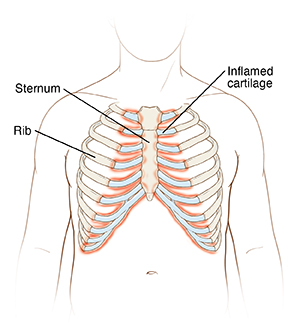Costochondritis is inflammation of a rib or the cartilage that connects a rib to your breastbone (sternum). It causes soreness or tenderness when you press the area where the rib joins the breastbone. It may cause chest pain that can be sharp or aching or feel like pressure. The pain may get worse with deep breathing, coughing, movement, or exercise. It is relieved when you stop moving and breathe quietly. In some cases, the pain is mistaken for a heart attack. But the condition is not serious. Read on to learn more about the condition and how it can be treated.
What causes costochondritis?
Costochondritis may happen after a chest injury, chest infection, or bout of coughing. Some physical activities like strenuous exercise or heavy lifting may lead to it. If you have large breasts, you may be more likely to have the condition. Often, the cause is unknown.
Diagnosing costochondritis
There is no test for costochondritis. The condition is diagnosed by the symptoms you have. Your doctor will give you a physical exam. They will ask about your symptoms and examine your chest for pain. In some cases, tests are done to rule out more serious problems. These tests may include chest X-rays, CT scans, or ECGs.
Treating costochondritis
If a cause is found, treatment for that will likely relieve the problem. Costochondritis often goes away on its own. The course of the condition varies from person to person. It usually lasts from weeks to months. In some cases, mild symptoms continue for months to years. To ease symptoms:
-
Take medicines as directed by your doctor. These relieve pain and swelling. Ibuprofen or other NSAIDs are often advised.
-
For over-the-counter pain relievers, do not take more than the amount recommended on the bottle.
-
Before using these medicines, tell your doctor if you have heart disease, high blood pressure, kidney disease, or liver disease. Also tell your doctor if you had stomach ulcers or internal bleeding in the past.
-
Check with your doctor before starting any herbal supplements. They may interfere with your medicines.
-
-
In some cases, you may be given prescription medicine, such as muscle relaxants.
-
Don't do activities that put stress on your chest or spine.
-
Apply a heating pad (set to warm, not high, heat) to your breastbone several times a day.
-
Do stretching exercises as directed.
When to contact your doctor
Contact your doctor right away if you have:
-
Pain that is not relieved by medicine.
-
Shortness of breath.
-
Lightheadedness, dizziness, or fainting.
-
A feeling of an irregular heartbeat or a fast pulse.
-
A high fever.
-
Signs of infection, such as pus, redness, or swelling around your ribs.
Anyone with chest pain should see a doctor, especially older adults and people at risk for heart disease.


